Job evaluation is of significant importance for both employers and employees, as it serves as the foundation for establishing a fair and effective compensation system within an organization. The primary goal of job evaluation is to establish a fair and equitable internal pay structure by objectively measuring and comparing the demands, responsibilities, and qualifications of various positions.
- Why Job Evaluation Is Essential?
- How to Select The Best Job Evaluation Software?
- Comparison Chart of Job Evaluation Software
- 8 Best Job Evaluation Software to Empower HR Managers
- Job Evaluation FAQ
Why Job Evaluation Is Essential?
Equity and fairness: Job evaluation ensures that compensation is based on the relative value of each job within the organization. It helps in establishing a fair and equitable pay structure, preventing pay discrimination and promoting internal pay equity.
Attracting and retaining talent: A well-structured job evaluation system can help organizations offer competitive salaries, benefits, and rewards, making them more attractive to potential candidates. It also plays a crucial role in retaining valuable employees by recognizing their contributions and providing a clear career progression path.
Employee morale and motivation: When employees perceive that their compensation is fair and reflective of their job’s worth, it boosts their morale and motivation. This, in turn, leads to increased job satisfaction and improved productivity.
Organizational structure: Job evaluation aids in defining and clarifying the roles and responsibilities of each position within the organization. It helps in creating a well-defined organizational structure with clear reporting lines and job hierarchies.
How to Select The Best Job Evaluation Software?
How do you choose the very best job evaluation tool for your needs? Below are a few things to look out for in online evaluation software:
Job analysis and data input
Assess how the software facilitates the job analysis process and data input. It should allow for the creation and maintenance of detailed job descriptions, skills, and competencies. The system should support flexibility in capturing information relevant to different job roles.
User-Friendly interface
Look for software with an intuitive and user-friendly interface. A straightforward system will make it easier for HR professionals and evaluators to navigate the software, reducing the learning curve and potential errors.
Integration with HRIS and other systems
Consider whether the job evaluation software integrates seamlessly with your existing Human Resources Information System (HRIS) or other related software. Integration can improve data accuracy, reduce duplicate efforts, and streamline processes.
Vendor reputation and support
Research the reputation of the software vendor. Look for reviews, testimonials, and case studies to understand the experiences of other organizations. Additionally, evaluate the level of customer support and training provided by the vendor.
Trial and demo
Before making a final decision, request a trial or demo of the software. This hands-on experience will allow you to assess the usability, functionality, and compatibility of the software with your organization’s needs.
Comparison Chart of Job Evaluation Software
| Software | Pro | Con | Ratting |
|---|---|---|---|
| OnlineExamMaker | Automatic grading and ranking of candidates | Software interface doesn’t support multiple language so far | G2, 4.5/5 |
| TalentLMS | Gamification elements to engage learners and increase motivation | Limited features for remote secure assessments. | G2, 4.6/5 |
| Mercer Job Evaluation | Access to Mercer’s extensive compensation data | Higher cost compared to some other solutions | G2, 4.4/5 |
| Payscale | Validated Data-as-a-Service (DaaS) solutions for HR | Some users may find advanced features limited in the basic plan | G2, 4.4/5 |
| Korn Ferry | Get an in-depth understanding of the characteristics of your workforce | Pricing and detailed features may require inquiries to sales | G2, 4.2/5 |
| Compport | Competitive, equitable and fair pay practices to attract and retain talent | Limited information on pricing and features on the website | G2, 4.8/5 |
| SAP SuccessFactors | Talent intelligence to fuel mobility at scale | Some users may find the interface complex for small-scale need | G2, 3.9/5 |
| Schoology | Mobile accessibility through the Schoology mobile app | Staffs may spend time to be familiar with the interfac | G2, 4.4/5 |
8 Best Job Evaluation Software to Empower HR Managers
- 1. OnlineExamMaker
- 2. TalentLMS
- 3. Mercer Job Evaluationn
- 4. Payscale
- 5. Korn Ferry
- 6. Compport
- 7. SAP SuccessFactors
- 8. Schoologyn
1. OnlineExamMaker
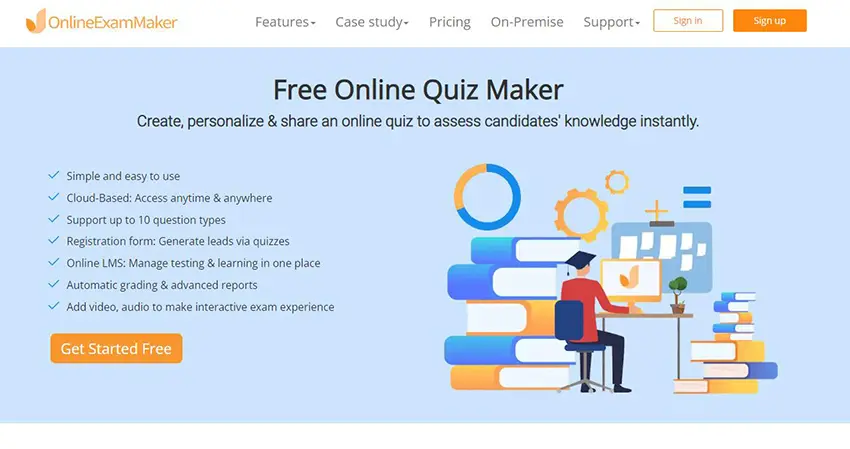
OnlineExamMaker is an all-in-one learning management system can be used on employee training, job evaluation, and performance assessment. The software designed to streamline the compensation management process for businesses of all sizes. It provides a centralized platform for evaluating job roles, defining pay grades, and ensuring fair and competitive compensation practices. With advanced analytics and reporting capabilities, OnlineExamMaker empowers HR professionals to make data-driven decisions and optimize their compensation strategies.
HR managers are able to add or import candidates, divide them into different groups according to similar exams taken, or assign them to specific groups. Users can set up courses available for particular learners, create learning goal, and charges for the courses.
Product Hightlights
Poerful question bank
Users can import bulk questions to your question bank at the same time from your computer by using specific format excel or word document. The question bank system Supports up to 10 different types of questions, including multiple choice, true-false, fill in the blanks, subjective, match matrix and more.
Face Id recognition
To ensure the appropriate person is taking an exam, the test-taker is checked-in and verified through a face photo and ID prior to starting the test. Once checked in, the test-taker is directed to their virtual exam to begin.
Group testing & learning
Add or import candidates, divide them into different groups according to similar exams taken, or assign them to specific groups. Easily assign the created exam to a group containing multiple candidates to assess particular learners directly. Set up courses available for particular learners, create learning goal, and charges for the courses.
Pros:
• Simplified job evaluation and automatic grading.
• Employee account management system & new member signup form.
• Real-time market benchmarking
• Brand identity: Add brand logo, domain, and slogan.
• Automatic grading and ranking of candidates.
• Build stunning academy homepage in minutes.
• Deliver testing & learning on any device.
Cons:
• Software interface doesn’t support multiple language so far.
G2 Rating: 4.5/5
Pricing: Free forever. Subscription available for $17/month for Essential plan, $35/month for Professional plan, or $55/month for Premium plan
Create Your Next Quiz/Exam with OnlineExamMaker
2. TalentLMS
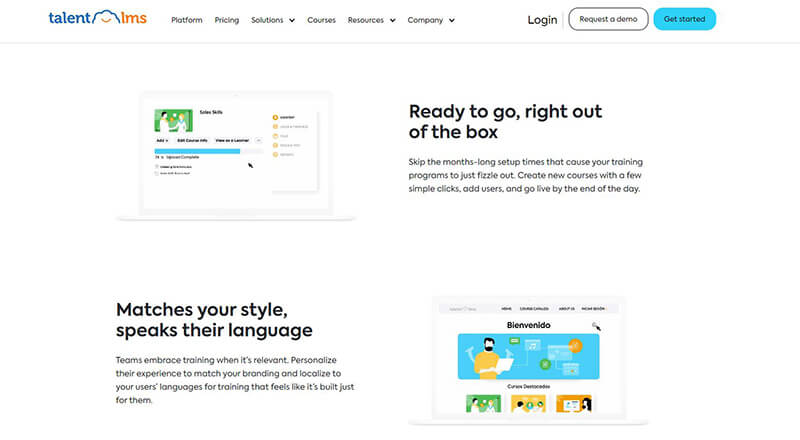
If you are HR of small or mid-size companies looking for learning and assessment solution for your company, TalentLMS is one of the best platforms for you. TalentLMS is the ultimate Learning Management System that empowers organizations to deliver effective training, enhance employee skills, and evaluate their skills and knowledge.
With its user-friendly interface, mobile accessibility, and array of features like gamification and progress tracking, TalentLMS brings innovation to learning experiences. From small businesses to enterprises, TalentLMS offers tailor-made solutions, ensuring a seamless integration into your organization’s training strategy and optimizing employee development.
Pros:
• Gamification elements to engage learners and increase motivation.
• Custom branding options to match your organization’s identity.
• Built-in assessment tools for quizzes and exams.
• Certifications and badges to recognize learner achievements.
• Automated notifications and reminders for course deadlines and updates.
Cons:
• Limited features for remote secure assessments.
G2 Rating: 4.6/5
Pricing: TalentLMS provide 4 paid plans, $69/month for Starter plan, $149/month for Basic plan, $279/month for Plus plan, $459/month for Premium plan.
3. Mercer Job Evaluation
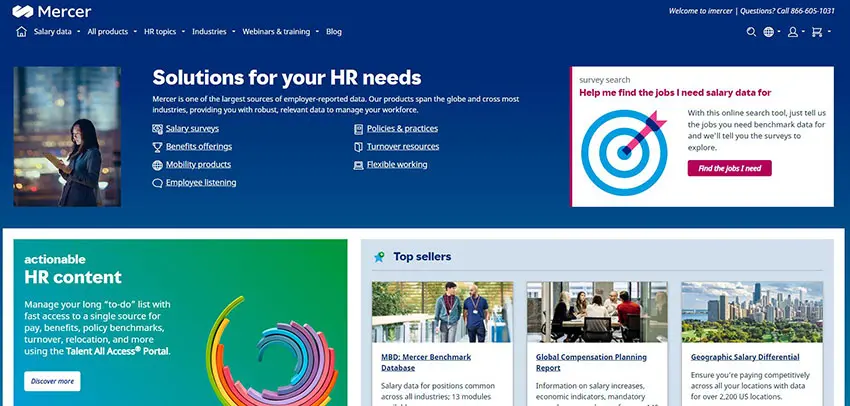
Mercer Job Evaluation is a globally recognized job evaluation solution that helps organizations establish equitable and market-competitive compensation structures. It offers comprehensive job assessment methodologies to assess job roles and ensure internal equity. Mercer’s extensive expertise in HR consulting ensures accurate evaluations based on industry benchmarks and market data.
Pros:
• Reliable and well-established methodology.
• Access to Mercer’s extensive compensation data.
• Expert consulting and support.
• General industry salary surveys for human resource.
Cons:
• Higher cost compared to some other solutions.
G2 Rating: 4.4/5
Pricing: Custom
4. Payscale
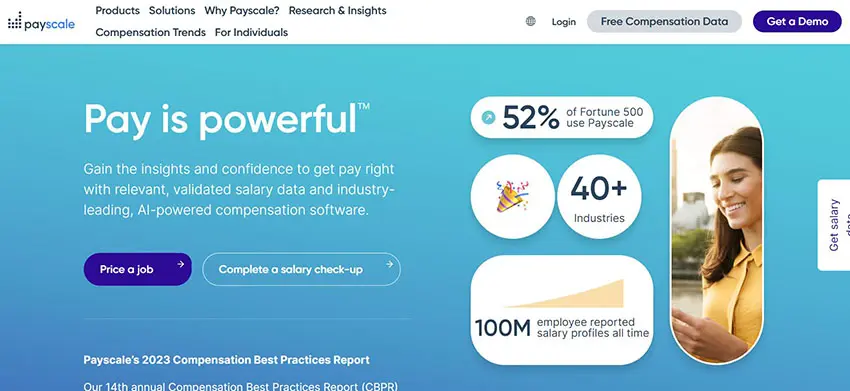
Payscale is a widely-used compensation management platform that offers a job evaluation feature as part of its comprehensive solution. It allows organizations to evaluate job roles, benchmark salaries against industry data, and maintain pay equity.
Pros:
• Large salary database for market comparison.
• Validated Data-as-a-Service (DaaS) solutions for HR.
• Customizable compensation reports.
• Fresher data to keep pace with your peers.
Cons:
• Some users may find advanced features limited in the basic plans.
G2 Rating: 4.4/5
Pricing: Custom
5. Korn Ferry

The Hay Group Methodology, now part of Korn Ferry, is a renowned job evaluation approach used by organizations globally. The platform provides powerful tools to analyze and assess job roles based on factors like skills, responsibilities, and job complexity.
Pros:
• Talent assessments to enable you to make the right decisions.
• Get an in-depth understanding of the characteristics of your workforce.
• Design personalized development programs for your workforce.
• Talent management system for all employees.
Cons:
• Pricing and detailed features may require inquiries to sales.
G2 Rating: 4.2/5
Pricing: Custom price quote.
6. Compport
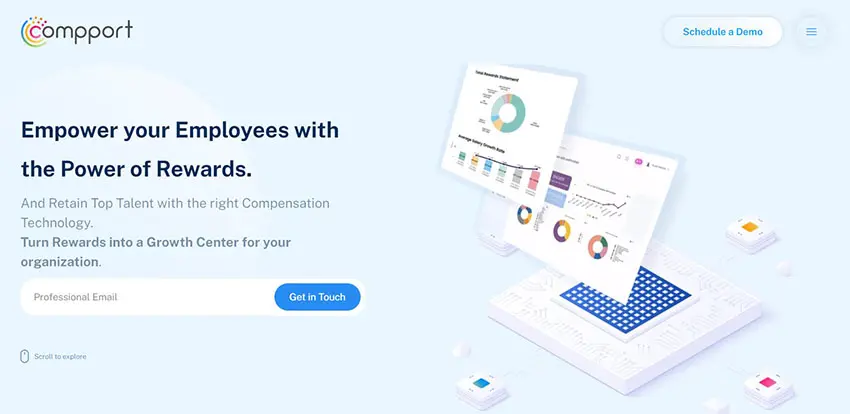
Compport is a cloud-based compensation management platform that includes job evaluation features. It helps organizations create transparent and fair compensation structures based on a data-driven approach.
Compport provides API Integration with all other existing data systems for seamless back and forth data flow, it is the best platform to drive employee attraction and retention for all sizes of businesses.
Pros:
• Competitive, equitable and fair pay practices to attract and retain talent.
• Scaling with top end infra support.
• Maximize sales perfomance by streamling the process of sales incentives.
• Automate the most crucial stage of the hiring process with a tech forward approach.
• Digitize your R&R schemes, and make recognition part of your culture.
Cons:
• Limited information on pricing and features on the website.
G2 Rating: 4.8/5
Pricing: Custom price quote.
Pro Tip
Want to assess your staffs online? Create an online quiz for free!
7. SAP SuccessFactors
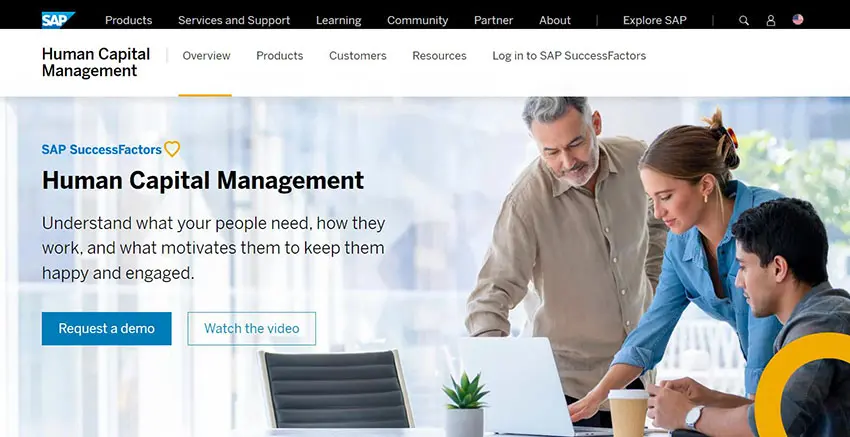
SAP SuccessFactors is a comprehensive HR management suite that includes job evaluation capabilities. It offers a holistic approach to compensation management, enabling organizations to align pay with performance and market standards. With business AI for human experience management, SAP SuccessFactors can help you handle employee assessment, training and awards.
Pros:
• Integrated with broader HR functions.
• Talent intelligence to fuel mobility at scale.
• Automated compliance for peace of mind.
• Talent intelligence hub powers AI-recommendations.
• Explore the value of intelligent HR technology.
Cons:
• Some users may find the interface complex for small-scale needs.
G2 Rating: 3.9/5
Pricing: Custom.
8. Schoology
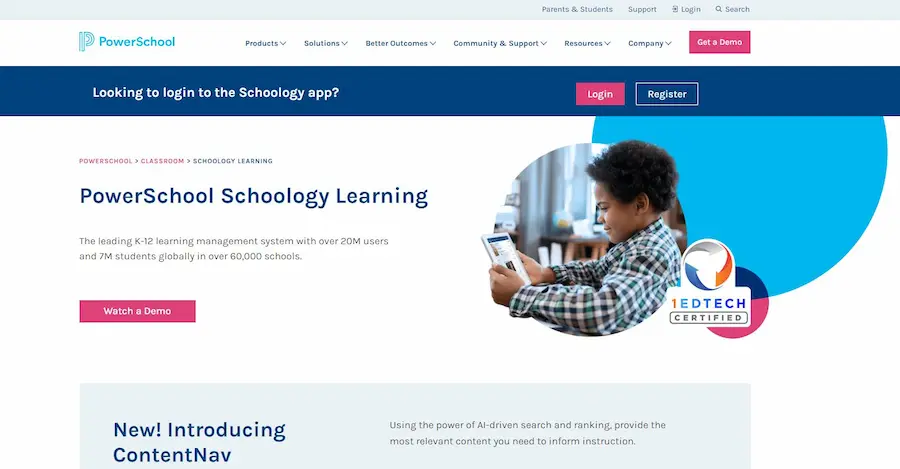
Schoology is a comprehensive learning management system (LMS) that empowers HR managers and staffs to connect, collaborate, and engage in training & assessment. With its user-friendly interface and robust features, Schoology provides a powerful platform for managing and delivering personalized employee evaluation experiences.
Pros:
• Easily create and organize course content for seamless navigation and access.
• Mobile accessibility through the Schoology mobile app.
• Resource library for easy access to learning materials.
• Rubric-based assessment and feedback options.
• Cross-platform compatibility for accessibility on various devices.
Candidate management system to handle employee account.
Cons:
• Staffs may spend time to be familiar with the interface.
G2 Rating: 4.4/5
Pricing: Custom
Job Evaluation FAQ
What is job evaluation?
Job evaluation is a systematic process used by organizations to assess and determine the relative value or worth of different jobs within the company. It aims to establish a fair and equitable internal pay structure.
Why is job evaluation important?
Job evaluation is crucial for ensuring fairness and consistency in compensation. It helps organizations align pay with the relative value of different jobs, promoting internal equity and employee satisfaction.
What factors are considered during job evaluation?
Factors commonly considered include job responsibilities, required skills and qualifications, decision-making authority, working conditions, and other relevant aspects that contribute to the overall value of a job.
What are the different methods of job evaluation?
Common methods include point-factor analysis, job ranking, and job classification. Point-factor analysis assigns points based on specific factors, ranking involves ordering jobs by importance, and job classification groups jobs into predefined classes.
How does job evaluation contribute to fair compensation?
By systematically assessing and comparing jobs, job evaluation helps organizations establish a pay structure that reflects the relative worth of each position. This promotes fairness and minimizes pay inequities.
Can job evaluation be subjective?
While job evaluation aims to be objective, there may be some subjectivity involved, especially in the interpretation of factors. To minimize this, organizations often use structured methodologies and involve multiple evaluators or committees.
How does job evaluation support employee motivation?
Fair and transparent job evaluation processes can positively impact employee morale and motivation. When employees perceive that their efforts are recognized and compensated fairly, it can contribute to job satisfaction and engagement.